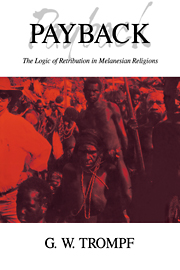Book contents
- Front Matter
- Contents
- Illustrations and tables
- Preface
- Abbreviations
- Preliminaries: The Theory of Retributive Logic
- Part One 'TRADITION'
- Part Two 'CARGO CULTISM'
- Part Three 'MODERNIZATION'
- Chapter 7 Recrimination—in ‘Modern’ Guises
- Chapter 8 Making Money and Modernizing Reciprocities
- Chapter 9 Money, Morals, Meaning: Old Logics, New Retributions?
- Conclusions and Recommendations
- Bibliography
- Index of Melanesian Cultures
- General Index
Chapter 7 - Recrimination—in ‘Modern’ Guises
Published online by Cambridge University Press: 22 September 2009
- Front Matter
- Contents
- Illustrations and tables
- Preface
- Abbreviations
- Preliminaries: The Theory of Retributive Logic
- Part One 'TRADITION'
- Part Two 'CARGO CULTISM'
- Part Three 'MODERNIZATION'
- Chapter 7 Recrimination—in ‘Modern’ Guises
- Chapter 8 Making Money and Modernizing Reciprocities
- Chapter 9 Money, Morals, Meaning: Old Logics, New Retributions?
- Conclusions and Recommendations
- Bibliography
- Index of Melanesian Cultures
- General Index
Summary
Four Melanesian nations achieved independence during the later decades of the twentieth century—Fiji in 1970, Papua New Guinea in 1975, the Solomons in 1978 and Vanuatu in 1980. In those sectors of the region which have remained dependent (Irian Jaya [or West Papua] being an Indonesian province and New Caledonia, a French colony), there have also been internationally publicized campaigns, even military action, for decolonization during the 1980s. The journey from tribal separatisms to nationhood (let alone pan-Melanesian alliances) involves massive changes in consciousness. It is a voyage accompanied by much questioning, a reorientation of cosmic pictures, adjustments in values and prejudices, and a discovery of new ‘truths’ along with discarding or modifying the old. All this has everything to do with religion. Since traditional cultures remain virtually indistinguishable from religions (Geertz 1975: 88–125), it is natural that the typical Melanesian response to the unprecedented social changes of the colonial era should be ‘new religious movements’ (Turner 1977, cf. Mair 1959). But then, missionization was a key element in these changes, and no consideration of changing consciousness and values as preparation for the embracing of national independence can disregard the massive effects of missionary (especially Christian) activity (Trompf 1991: 139–87). The introduction of the colonial powers' inherited religion into traditional societies, in fact, is a key factor in the processes called ‘modernization’ (cf., e.g., Lerner 1956; Apter 1965; Black 1966; Weiner 1966; Singer 1972; Chirot 1977; Higgott 1983).
- Type
- Chapter
- Information
- PaybackThe Logic of Retribution in Melanesian Religions, pp. 288 - 374Publisher: Cambridge University PressPrint publication year: 1994

